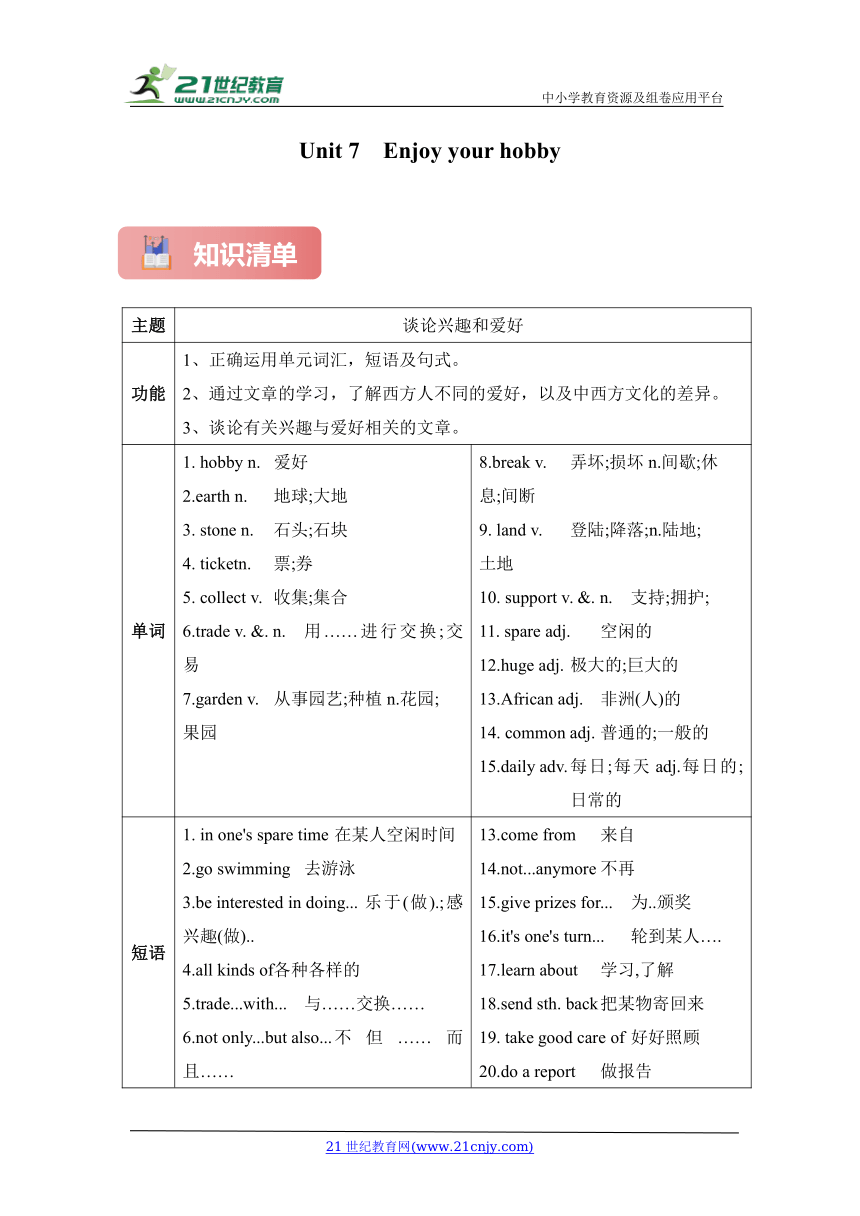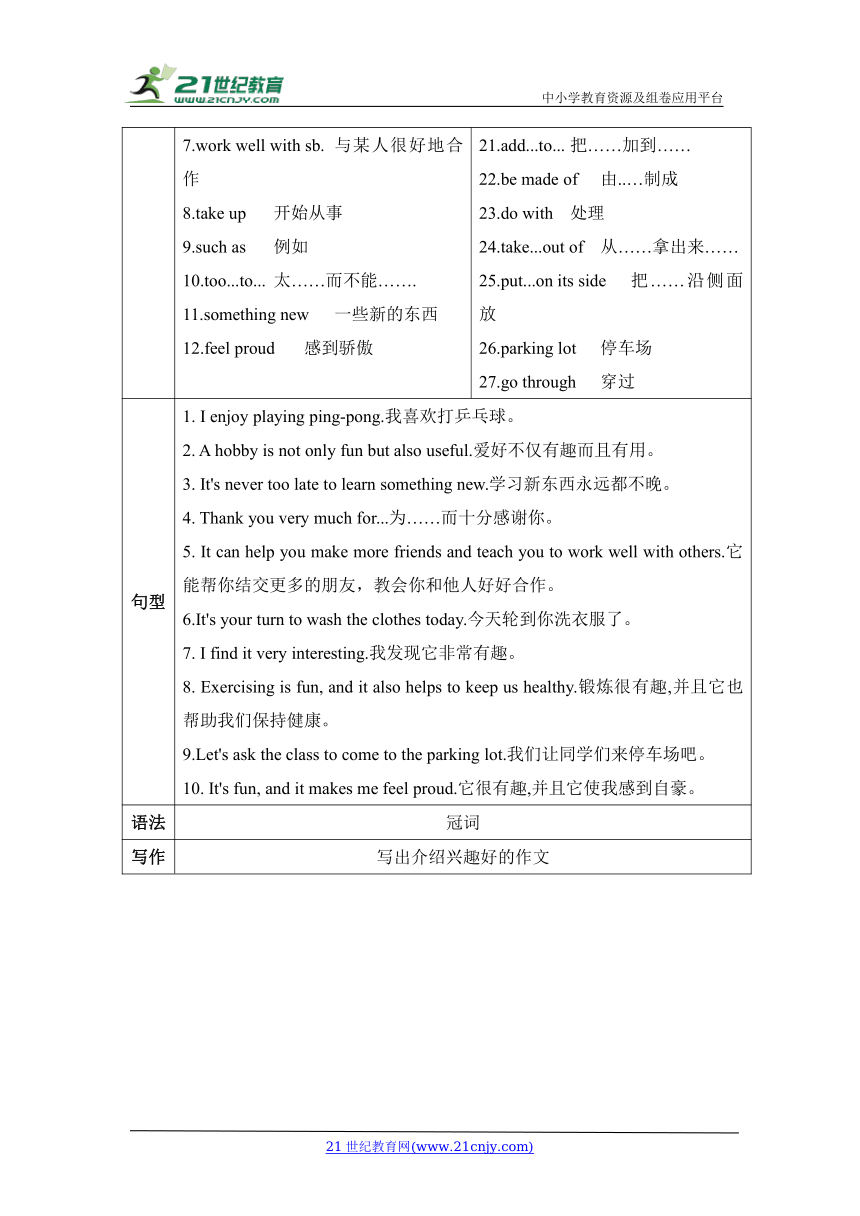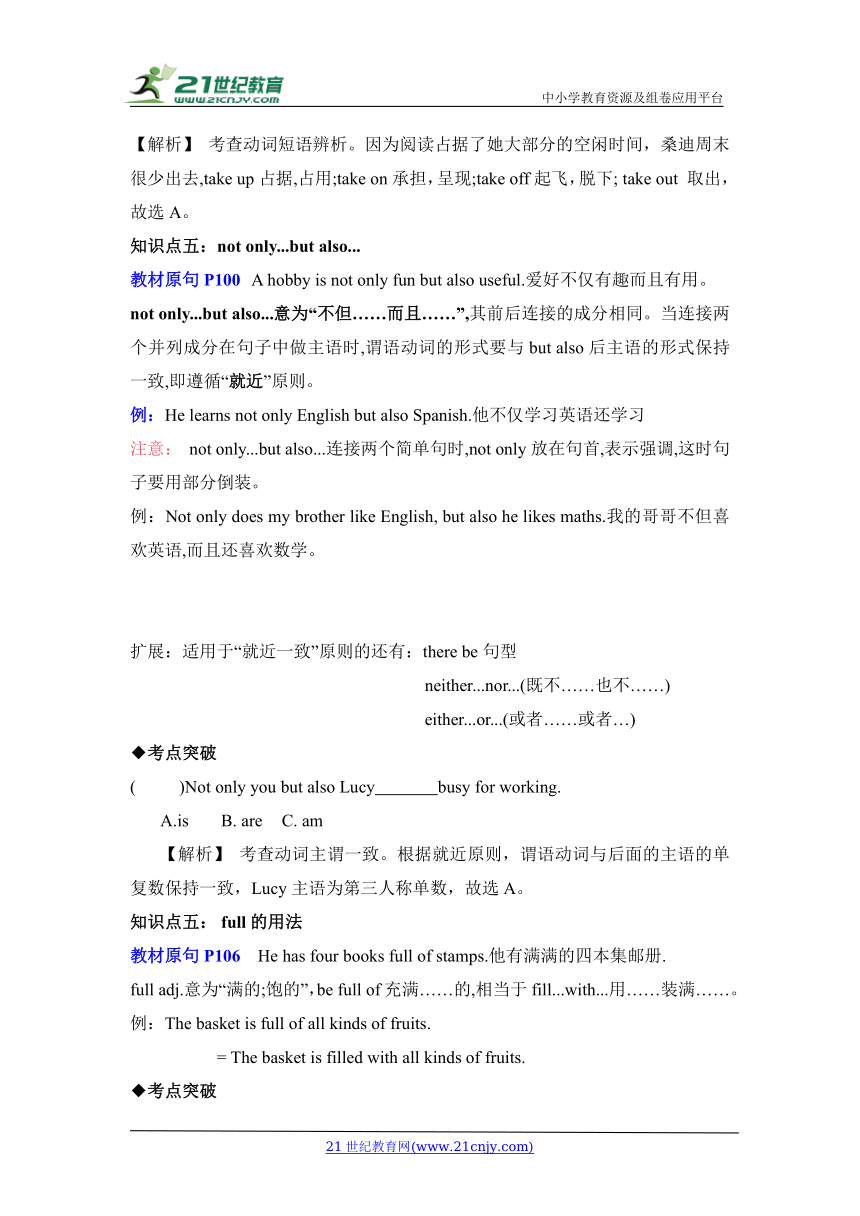【名师导航】Unit 7 Enjoy Your Hobby早读过关知识清单(冀教八上)
文档属性
| 名称 | 【名师导航】Unit 7 Enjoy Your Hobby早读过关知识清单(冀教八上) |

|
|
| 格式 | docx | ||
| 文件大小 | 173.8KB | ||
| 资源类型 | 试卷 | ||
| 版本资源 | 冀教版 | ||
| 科目 | 英语 | ||
| 更新时间 | 2023-12-22 00:00:00 | ||
图片预览





文档简介
中小学教育资源及组卷应用平台
Unit 7 Enjoy your hobby
主题 谈论兴趣和爱好
功能 正确运用单元词汇,短语及句式。 通过文章的学习,了解西方人不同的爱好,以及中西方文化的差异。 谈论有关兴趣与爱好相关的文章。
单词 1. hobby n. 爱好 2.earth n. 地球;大地 3. stone n. 石头;石块 4. ticketn. 票;券 5. collect v. 收集;集合 6.trade v. &. n. 用……进行交换;交易 7.garden v. 从事园艺;种植n.花园; 果园 8.break v. 弄坏;损坏n.间歇;休 息;间断 9. land v. 登陆;降落;n.陆地; 土地 10. support v. &. n. 支持;拥护; 11. spare adj. 空闲的 12.huge adj. 极大的;巨大的 13.African adj. 非洲(人)的 mon adj. 普通的;一般的 15.daily adv. 每日;每天adj.每日的; 日常的
短语 1. in one's spare time 在某人空闲时间 2.go swimming 去游泳 3.be interested in doing... 乐于(做).;感兴趣(做).. 4.all kinds of 各种各样的 5.trade...with... 与……交换…… 6.not only...but also... 不但……而且…… 7.work well with sb. 与某人很好地合作 8.take up 开始从事 9.such as 例如 10.too...to... 太……而不能……. 11.something new 一些新的东西 12.feel proud 感到骄傲 e from 来自 14.not...anymore 不再 15.give prizes for... 为..颁奖 16.it's one's turn... 轮到某人…. 17.learn about 学习,了解 18.send sth. back 把某物寄回来 19. take good care of 好好照顾 20.do a report 做报告 21.add...to... 把……加到…… 22.be made of 由..…制成 23.do with 处理 24.take...out of 从……拿出来…… 25.put...on its side 把……沿侧面放 26.parking lot 停车场 27.go through 穿过
句型 1. I enjoy playing ping-pong.我喜欢打乒乓球。 2. A hobby is not only fun but also useful.爱好不仅有趣而且有用。 3. It's never too late to learn something new.学习新东西永远都不晚。 4. Thank you very much for...为……而十分感谢你。 5. It can help you make more friends and teach you to work well with others.它能帮你结交更多的朋友,教会你和他人好好合作。 6.It's your turn to wash the clothes today.今天轮到你洗衣服了。 7. I find it very interesting.我发现它非常有趣。 8. Exercising is fun, and it also helps to keep us healthy.锻炼很有趣,并且它也帮助我们保持健康。 9.Let's ask the class to come to the parking lot.我们让同学们来停车场吧。 10. It's fun, and it makes me feel proud.它很有趣,并且它使我感到自豪。
语法 冠词
写作 写出介绍兴趣好的作文
知识点
知识点一 动名词(短语)做主语的用法
教材原句 P98 Exercising is fun, and it also helps to keep us healthy.锻炼很有趣,并且它也帮助我们保持健康。
Exercising:动名词,做主语时,谓语动词用第三人称单数形式。
注:用and连接两个动名词或动名词短语做主语时,谓语动词用复数形式。
例:Doing exercise and eating fruit are good for your health.锻炼和吃水果对你的健康有好处。
◆考点突破
( )As we all know, using public chopsticks necessary when we eat with others.
A.is B.are C.was D.were
【解析】 考查主谓一致及时态。
句意:众所周知,当我们和别人一起用餐时使用公共筷子是有必要的。using public chopsticks是动名词短语做主语,谓语动词用单数形式。本句是一般现在时,故选A。
知识点二 “find+宾语+宾语补足语”的用法
教材原句P98 I find it very interesting.我发现它很有趣。
“find+宾语十宾语补足语”意为“发现……处于某种状态”宾语补足语通常为名词、形容词或介词短语等。
扩展:“find+it+形容词/名词短语+to do sth.” 发现做某事...
it为find的形式宾语,动词不定式为真正的宾语。
I find it difficult to do this.
◆考点突破
( )The twins are so alike that even their father finds hard to tell them from each other.
A.it B.him C.them D.she
【解析】查代词it的用法。句意:这对双胞胎如此相像,以至于他们的父亲都发现把他们区分开很困难。find it +adj.+ to do sth.发现做某事……,it做形式宾语。真正的宾语是后面的不定式,故选A。
知识点三 trade的用法
教材原P98 I also trade my tickets with other people.我还把我的票和别人交换。
trade 动词,“用……进行交换,交易,做买卖,做生意”。
Many foreigners visit China, and many countries trade with China.许多外国人访问中国,许多国家与中国进行贸易。
固定搭配
trade with...与……交易;trade sth. with sb.与某人交换某物;
trade...for sth.用……交换某物。
America's trade laws are fiendishly complex. 美国的贸易法极为复杂。
Will you trade your ball for my model plane 你愿意拿你的球换我的飞机模型吗
考点拓展 trade n.交易;贸易
trader n.商人
知识点四:take up的用法
教材原句P100 People usually take up their first hobby when they are kids, but hobbies are fun for all ages.人们通常在儿时就有了他们的第一个爱好,但是爱好对所有年龄段的人来说都是有趣的。
take up :“开始从事,占据”,后接名词、代词或动名词。
take up a hobby 意为“养成一种爱好”。
◆考点突破
Sandy seldom goes out at weekends because reading most of her free time.
A.takes up B. takes on C.takes off D.takes out
【解析】 考查动词短语辨析。因为阅读占据了她大部分的空闲时间,桑迪周末很少出去,take up占据,占用;take on承担,呈现;take off起飞,脱下; take out 取出,故选A。
知识点五:not only...but also...
教材原句P100 A hobby is not only fun but also useful.爱好不仅有趣而且有用。
not only...but also...意为“不但……而且……”,其前后连接的成分相同。当连接两个并列成分在句子中做主语时,谓语动词的形式要与but also后主语的形式保持一致,即遵循“就近”原则。
例:He learns not only English but also Spanish.他不仅学习英语还学习
注意: not only...but also...连接两个简单句时,not only放在句首,表示强调,这时句子要用部分倒装。
例:Not only does my brother like English, but also he likes maths.我的哥哥不但喜欢英语,而且还喜欢数学。
扩展:适用于“就近一致”原则的还有:there be句型
neither...nor...(既不……也不……)
either...or...(或者……或者…)
◆考点突破
( )Not only you but also Lucy busy for working.
A.is B. are C. am
【解析】 考查动词主谓一致。根据就近原则,谓语动词与后面的主语的单复数保持一致,Lucy主语为第三人称单数,故选A。
知识点五: full的用法
教材原句P106 He has four books full of stamps.他有满满的四本集邮册.
full adj.意为“满的;饱的”,be full of充满……的,相当于fill...with...用……装满……。
例:The basket is full of all kinds of fruits.
= The basket is filled with all kinds of fruits.
◆考点突破
( )Life is love everywhere. Let's enjoy it.
A. full of B.made of C.proud of D.afraid of
【解析】考查词义辨析。句意:生活到处充满爱。让我们享受生活。
be full of 充满……;be made of由……制成;
be proud of为.….而自豪; be afraid of 害怕……。
根据“enjoy it"可知,这里表示充满爱,故选A。
知识点六: confidence的用法
教材原句P100 A hobby can help build your confident and make your life more colourful.爱好能帮助你建立自信心且使你的生活更加丰富多彩。
confidence 名词,意为“自信,信心”
build one's confidence 意树立某人的信心。
例:Parents should help their children build their confidence.父母应该助他们的孩子树立信心。
固定搭配 have confidence in sth.对……有信心
lose confidence sth. 对……失去信心
拓展 confident adj. “有信心的”。
知识点七: It's one's turn.的用法
教材原句P106 Finally,it's Danny's turn.最后,轮到丹尼了。
one's 用形容词性物主代词或所有格。
It's one's turn. 意为“轮到某人了”。
It's one's turn to do sth.意为“轮到某人做某事了”。
例:It's Jim's turn to do the dishes.轮到吉姆洗碗了。
固定搭配 by turns轮流,交替;in turns依次,轮流;take turns to do 轮流去做
语法点
冠词
(一)不定冠词的用法
不定冠词有两个:a和an
a用在以辅音音素开头的名词前
an用在以元音音素开头的名词前。
1.第一次提到某人或某物而非特指时。
I find an interesting one, I take it home and add it to my collection.如果我找到一块有趣的石头,我把它带回家并添加到我的收藏品中。
表示数量“一”,但数的概念没有one强。
Have a cup of tea , please.请喝一杯茶。
I have a mouth, a nose and two eyes.我有一张嘴、一个鼻子和两只眼睛。
3.泛指人或事物的类别。
Did you know the sun is a star 你们知道太阳是恒星吗
4.表示“每一”,相当于every。
We have five English lessons a week.我们每周上五节英语课。
5.用于某些固定词组中。
a few , have a look , in a hurry , take a walk, have a good time, a bit, a little, a lot of,
(二)定冠词的基本用法
1.特指某人或某物。
The book on the desk is mine.书桌上的那本书是我的。
2.指双方都知道的人或物。
Who is the girl under the tree 树下那个女孩是谁
3.用来指上文提到过的人或物。
There is a picture on the wall. The picture is very beautiful.墙上有一幅画。这幅画很漂亮。
4.用在表示方位的名词或世上独一无二的事物的名词前。
I like the picture on the right best.我最喜欢右边的那幅画。
The sun gives us light and heat.太阳给我们光和热。
5.用在姓氏复数形式之前,表示“一家人”或“夫妇”。
The Greens are having dinner.格林一家正在吃饭。
The Whites like swimming very much.怀特夫妇非常喜欢游泳。
6.用在序数词或形容词的最高级之前。
The first month of the year is January.一年中的第一个月是一月。
Winter is the coldest season of the year.冬天是一年中最冷的季节。
7.用在形容词前,表示“一类人或物”。
The rich should help the poor.富人应该帮助穷人。
8.用在由普通名词构成的专有名词前。
the Yellow River黄河 the Great Wall 长城
用在乐器名词之前。
She is playing the piano.她正在弹钢琴。
Do you like playing the violin 你喜欢拉小提琴吗
10.用在一些习惯用语中。
in the evening, at the same time, in the front, all the same
at the beginning of, at the age of, in the end,
in the future, in the past, the other day, with the help of
on the way to, at the moment, by the way, in the middle of
(三)不用冠词的情况
1.在专有名词、物质名词和抽象名词前一般不用冠词。
I am in Class Two,Grade Three.我在三年级二班。
We cannot live without air.没有空气我们就不能生存。
2.名词前已有做定语的指示代词、物主代词、不定代词或数词时,不用冠词。
Pass me that book.递给我那本书。
I have some questions.我有一些问题。
This is our first lesson.这是我们的第一节课。
复数名词指一类人或事物时,不用冠词。
They are workers.他们是工人。
星期、月份、季节和节日名称前不用冠词。
It's Sunday today.今天是星期天。
June l is Children's Day.六月一日是儿童节。
5.三餐、球类、学科名词之前不用冠词。
I have supper at home.我在家吃晚饭。
He often plays football.他常常踢足球。
由介词by引出的交通工具名词前不用冠词。
We travelled by train.我们乘火车去旅游。
7.某些固定词组或习惯用语中不用冠词。
at night , go to school, by bus , on foot, at home , at work, in trouble , in line, at school, at noon, in time, in English, on time, for example
冠词用法口诀:
口诀一(不定冠词的用法):名词是秃子,常要戴帽子。
可数名词里,需用a或an。
辅音前用a,元音前用an。
复数不可数,泛指the不见。
碰到代词时,冠词均不现。
口诀二(定冠词的用法):特指双熟悉,上文已提及。
世上独无二,序数最高级。
某些专有名词、习语和乐器。
口诀三(零冠词的用法):
代词限定名词前,专有名词不可数。
学科球类三餐饭,四季星期月份前。
颜色语种和国名,称呼习语和头衔。
21世纪教育网(www.21cnjy.com)
Unit 7 Enjoy your hobby
主题 谈论兴趣和爱好
功能 正确运用单元词汇,短语及句式。 通过文章的学习,了解西方人不同的爱好,以及中西方文化的差异。 谈论有关兴趣与爱好相关的文章。
单词 1. hobby n. 爱好 2.earth n. 地球;大地 3. stone n. 石头;石块 4. ticketn. 票;券 5. collect v. 收集;集合 6.trade v. &. n. 用……进行交换;交易 7.garden v. 从事园艺;种植n.花园; 果园 8.break v. 弄坏;损坏n.间歇;休 息;间断 9. land v. 登陆;降落;n.陆地; 土地 10. support v. &. n. 支持;拥护; 11. spare adj. 空闲的 12.huge adj. 极大的;巨大的 13.African adj. 非洲(人)的 mon adj. 普通的;一般的 15.daily adv. 每日;每天adj.每日的; 日常的
短语 1. in one's spare time 在某人空闲时间 2.go swimming 去游泳 3.be interested in doing... 乐于(做).;感兴趣(做).. 4.all kinds of 各种各样的 5.trade...with... 与……交换…… 6.not only...but also... 不但……而且…… 7.work well with sb. 与某人很好地合作 8.take up 开始从事 9.such as 例如 10.too...to... 太……而不能……. 11.something new 一些新的东西 12.feel proud 感到骄傲 e from 来自 14.not...anymore 不再 15.give prizes for... 为..颁奖 16.it's one's turn... 轮到某人…. 17.learn about 学习,了解 18.send sth. back 把某物寄回来 19. take good care of 好好照顾 20.do a report 做报告 21.add...to... 把……加到…… 22.be made of 由..…制成 23.do with 处理 24.take...out of 从……拿出来…… 25.put...on its side 把……沿侧面放 26.parking lot 停车场 27.go through 穿过
句型 1. I enjoy playing ping-pong.我喜欢打乒乓球。 2. A hobby is not only fun but also useful.爱好不仅有趣而且有用。 3. It's never too late to learn something new.学习新东西永远都不晚。 4. Thank you very much for...为……而十分感谢你。 5. It can help you make more friends and teach you to work well with others.它能帮你结交更多的朋友,教会你和他人好好合作。 6.It's your turn to wash the clothes today.今天轮到你洗衣服了。 7. I find it very interesting.我发现它非常有趣。 8. Exercising is fun, and it also helps to keep us healthy.锻炼很有趣,并且它也帮助我们保持健康。 9.Let's ask the class to come to the parking lot.我们让同学们来停车场吧。 10. It's fun, and it makes me feel proud.它很有趣,并且它使我感到自豪。
语法 冠词
写作 写出介绍兴趣好的作文
知识点
知识点一 动名词(短语)做主语的用法
教材原句 P98 Exercising is fun, and it also helps to keep us healthy.锻炼很有趣,并且它也帮助我们保持健康。
Exercising:动名词,做主语时,谓语动词用第三人称单数形式。
注:用and连接两个动名词或动名词短语做主语时,谓语动词用复数形式。
例:Doing exercise and eating fruit are good for your health.锻炼和吃水果对你的健康有好处。
◆考点突破
( )As we all know, using public chopsticks necessary when we eat with others.
A.is B.are C.was D.were
【解析】 考查主谓一致及时态。
句意:众所周知,当我们和别人一起用餐时使用公共筷子是有必要的。using public chopsticks是动名词短语做主语,谓语动词用单数形式。本句是一般现在时,故选A。
知识点二 “find+宾语+宾语补足语”的用法
教材原句P98 I find it very interesting.我发现它很有趣。
“find+宾语十宾语补足语”意为“发现……处于某种状态”宾语补足语通常为名词、形容词或介词短语等。
扩展:“find+it+形容词/名词短语+to do sth.” 发现做某事...
it为find的形式宾语,动词不定式为真正的宾语。
I find it difficult to do this.
◆考点突破
( )The twins are so alike that even their father finds hard to tell them from each other.
A.it B.him C.them D.she
【解析】查代词it的用法。句意:这对双胞胎如此相像,以至于他们的父亲都发现把他们区分开很困难。find it +adj.+ to do sth.发现做某事……,it做形式宾语。真正的宾语是后面的不定式,故选A。
知识点三 trade的用法
教材原P98 I also trade my tickets with other people.我还把我的票和别人交换。
trade 动词,“用……进行交换,交易,做买卖,做生意”。
Many foreigners visit China, and many countries trade with China.许多外国人访问中国,许多国家与中国进行贸易。
固定搭配
trade with...与……交易;trade sth. with sb.与某人交换某物;
trade...for sth.用……交换某物。
America's trade laws are fiendishly complex. 美国的贸易法极为复杂。
Will you trade your ball for my model plane 你愿意拿你的球换我的飞机模型吗
考点拓展 trade n.交易;贸易
trader n.商人
知识点四:take up的用法
教材原句P100 People usually take up their first hobby when they are kids, but hobbies are fun for all ages.人们通常在儿时就有了他们的第一个爱好,但是爱好对所有年龄段的人来说都是有趣的。
take up :“开始从事,占据”,后接名词、代词或动名词。
take up a hobby 意为“养成一种爱好”。
◆考点突破
Sandy seldom goes out at weekends because reading most of her free time.
A.takes up B. takes on C.takes off D.takes out
【解析】 考查动词短语辨析。因为阅读占据了她大部分的空闲时间,桑迪周末很少出去,take up占据,占用;take on承担,呈现;take off起飞,脱下; take out 取出,故选A。
知识点五:not only...but also...
教材原句P100 A hobby is not only fun but also useful.爱好不仅有趣而且有用。
not only...but also...意为“不但……而且……”,其前后连接的成分相同。当连接两个并列成分在句子中做主语时,谓语动词的形式要与but also后主语的形式保持一致,即遵循“就近”原则。
例:He learns not only English but also Spanish.他不仅学习英语还学习
注意: not only...but also...连接两个简单句时,not only放在句首,表示强调,这时句子要用部分倒装。
例:Not only does my brother like English, but also he likes maths.我的哥哥不但喜欢英语,而且还喜欢数学。
扩展:适用于“就近一致”原则的还有:there be句型
neither...nor...(既不……也不……)
either...or...(或者……或者…)
◆考点突破
( )Not only you but also Lucy busy for working.
A.is B. are C. am
【解析】 考查动词主谓一致。根据就近原则,谓语动词与后面的主语的单复数保持一致,Lucy主语为第三人称单数,故选A。
知识点五: full的用法
教材原句P106 He has four books full of stamps.他有满满的四本集邮册.
full adj.意为“满的;饱的”,be full of充满……的,相当于fill...with...用……装满……。
例:The basket is full of all kinds of fruits.
= The basket is filled with all kinds of fruits.
◆考点突破
( )Life is love everywhere. Let's enjoy it.
A. full of B.made of C.proud of D.afraid of
【解析】考查词义辨析。句意:生活到处充满爱。让我们享受生活。
be full of 充满……;be made of由……制成;
be proud of为.….而自豪; be afraid of 害怕……。
根据“enjoy it"可知,这里表示充满爱,故选A。
知识点六: confidence的用法
教材原句P100 A hobby can help build your confident and make your life more colourful.爱好能帮助你建立自信心且使你的生活更加丰富多彩。
confidence 名词,意为“自信,信心”
build one's confidence 意树立某人的信心。
例:Parents should help their children build their confidence.父母应该助他们的孩子树立信心。
固定搭配 have confidence in sth.对……有信心
lose confidence sth. 对……失去信心
拓展 confident adj. “有信心的”。
知识点七: It's one's turn.的用法
教材原句P106 Finally,it's Danny's turn.最后,轮到丹尼了。
one's 用形容词性物主代词或所有格。
It's one's turn. 意为“轮到某人了”。
It's one's turn to do sth.意为“轮到某人做某事了”。
例:It's Jim's turn to do the dishes.轮到吉姆洗碗了。
固定搭配 by turns轮流,交替;in turns依次,轮流;take turns to do 轮流去做
语法点
冠词
(一)不定冠词的用法
不定冠词有两个:a和an
a用在以辅音音素开头的名词前
an用在以元音音素开头的名词前。
1.第一次提到某人或某物而非特指时。
I find an interesting one, I take it home and add it to my collection.如果我找到一块有趣的石头,我把它带回家并添加到我的收藏品中。
表示数量“一”,但数的概念没有one强。
Have a cup of tea , please.请喝一杯茶。
I have a mouth, a nose and two eyes.我有一张嘴、一个鼻子和两只眼睛。
3.泛指人或事物的类别。
Did you know the sun is a star 你们知道太阳是恒星吗
4.表示“每一”,相当于every。
We have five English lessons a week.我们每周上五节英语课。
5.用于某些固定词组中。
a few , have a look , in a hurry , take a walk, have a good time, a bit, a little, a lot of,
(二)定冠词的基本用法
1.特指某人或某物。
The book on the desk is mine.书桌上的那本书是我的。
2.指双方都知道的人或物。
Who is the girl under the tree 树下那个女孩是谁
3.用来指上文提到过的人或物。
There is a picture on the wall. The picture is very beautiful.墙上有一幅画。这幅画很漂亮。
4.用在表示方位的名词或世上独一无二的事物的名词前。
I like the picture on the right best.我最喜欢右边的那幅画。
The sun gives us light and heat.太阳给我们光和热。
5.用在姓氏复数形式之前,表示“一家人”或“夫妇”。
The Greens are having dinner.格林一家正在吃饭。
The Whites like swimming very much.怀特夫妇非常喜欢游泳。
6.用在序数词或形容词的最高级之前。
The first month of the year is January.一年中的第一个月是一月。
Winter is the coldest season of the year.冬天是一年中最冷的季节。
7.用在形容词前,表示“一类人或物”。
The rich should help the poor.富人应该帮助穷人。
8.用在由普通名词构成的专有名词前。
the Yellow River黄河 the Great Wall 长城
用在乐器名词之前。
She is playing the piano.她正在弹钢琴。
Do you like playing the violin 你喜欢拉小提琴吗
10.用在一些习惯用语中。
in the evening, at the same time, in the front, all the same
at the beginning of, at the age of, in the end,
in the future, in the past, the other day, with the help of
on the way to, at the moment, by the way, in the middle of
(三)不用冠词的情况
1.在专有名词、物质名词和抽象名词前一般不用冠词。
I am in Class Two,Grade Three.我在三年级二班。
We cannot live without air.没有空气我们就不能生存。
2.名词前已有做定语的指示代词、物主代词、不定代词或数词时,不用冠词。
Pass me that book.递给我那本书。
I have some questions.我有一些问题。
This is our first lesson.这是我们的第一节课。
复数名词指一类人或事物时,不用冠词。
They are workers.他们是工人。
星期、月份、季节和节日名称前不用冠词。
It's Sunday today.今天是星期天。
June l is Children's Day.六月一日是儿童节。
5.三餐、球类、学科名词之前不用冠词。
I have supper at home.我在家吃晚饭。
He often plays football.他常常踢足球。
由介词by引出的交通工具名词前不用冠词。
We travelled by train.我们乘火车去旅游。
7.某些固定词组或习惯用语中不用冠词。
at night , go to school, by bus , on foot, at home , at work, in trouble , in line, at school, at noon, in time, in English, on time, for example
冠词用法口诀:
口诀一(不定冠词的用法):名词是秃子,常要戴帽子。
可数名词里,需用a或an。
辅音前用a,元音前用an。
复数不可数,泛指the不见。
碰到代词时,冠词均不现。
口诀二(定冠词的用法):特指双熟悉,上文已提及。
世上独无二,序数最高级。
某些专有名词、习语和乐器。
口诀三(零冠词的用法):
代词限定名词前,专有名词不可数。
学科球类三餐饭,四季星期月份前。
颜色语种和国名,称呼习语和头衔。
21世纪教育网(www.21cnjy.com)
同课章节目录
- Unit 1 Me and My Class
- Lesson 1 Back to School!
- Lesson 2 Many Faces, One Picture
- Lesson 3 Getting to Know You!
- Lesson 4 Best Friends
- Lesson 5 Meet Ms. Liu
- Lesson 6 Jenny's Week
- Unit 2 My Favourite School Subject
- Lesson 7 Don't Be Late for Class!
- Lesson 8 E-mail Helpers!
- Lesson 9 I Don't Want to Miss Geography !
- Lesson 10 Looking for Lisa
- Lesson 11 Lily Learns about China !
- Lesson 12 Karen's Hair Stood Up!
- Unit Review
- Unit 3 Families Celebrate Togethe
- Lesson 13 I Love Autumn
- Lesson 14 Happy Memories
- Lesson 15 A Present for Li Ming!
- Lesson 16 Happy Thanksgiving!
- Lesson 17 Presents from Canada!
- Lesson 18 Li Ming's Birthday
- Unit Review
- Unit 4 My Neighbourhood
- Lesson 19 The Best Neighourhood
- Lesson 20 No Stopping!
- Lesson 21 Eat a Donut and Turn Right
- Lesson 22 I Like My Neighbourhood
- Lesson 23 People in My Neighbourhood
- Lesson 24 I Need a Map!
- Unit Review
- Unit 5 My Future
- Lesson 25 I Want to Be a Teacher!
- Lesson 26 What Will I Be ?
- Lesson 27 What's Your Advice?
- Lesson 28 Rich or Poor? It Doesn't Matter!
- Lesson 29 Our Ambitions and Dreams
- Lesson 30 A Famous Friend?
- Unit Review
- Unit 6 Go With Transportation !
- Lesson 31 How Do You Travel ?
- Lesson 32 Trains Go Faster !
- Lesson 33 Life on Wheels
- Lesson 34 Flying Donuts
- Lesson 35 Future Transportation
- Lesson 36 Clean Cars ?
- Unit Review
- Unit 7 Enjoy Your Hobby
- Lesson 37 What's Your Hobby ?
- Lesson 38 Hobbies Are Fun!
- Lesson 39 Danny's Hobby
- Lesson 40 What's Paul's Hobby?
- Lesson 41 Show and Tell!
- Lesson 42 The New Club
- Unit Review
- Unit 8 Celebrating Me
- Lesson 43 What Makes You Unique?
- Lesson 44 Georgia Plays Basketball
- Lesson 45 Be Yourself !
- Lesson 46 My Dream
- Lesson 47 I Made It !
- Lesson 48 Li Ming's Report
- Unit Review
